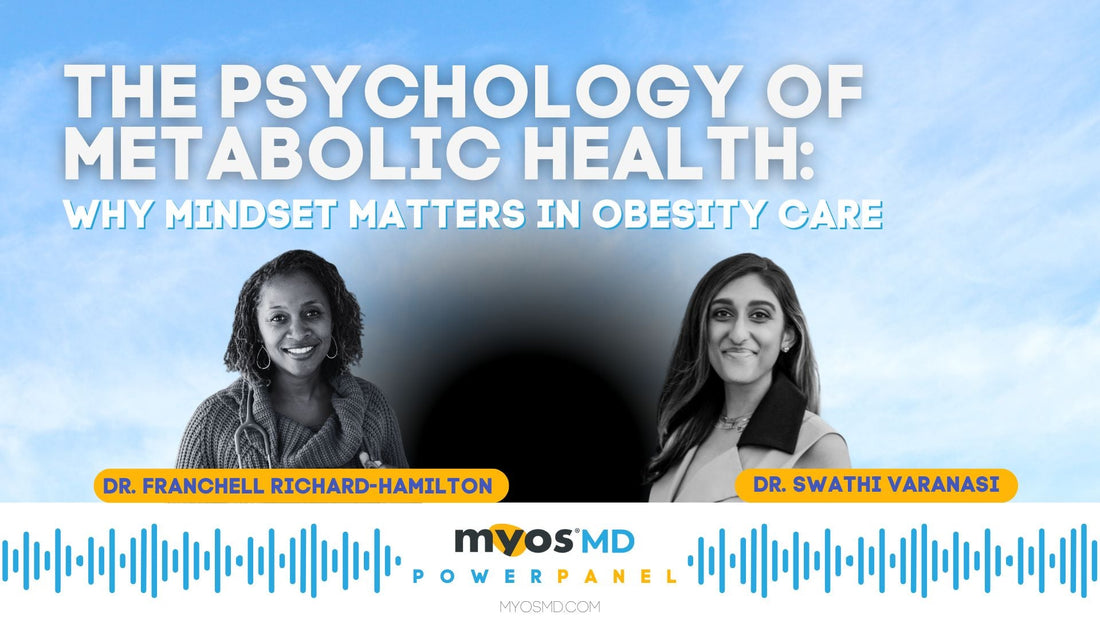Rethinking Obesity Care: Why Mindset Is the Missing Link
When it comes to metabolic health and sustainable weight loss, traditional diet and exercise prescriptions often fall short. That’s why Dr. Franchell Richard-Hamilton, MD, FASMBS, FACS—a board-certified bariatric surgeon and founder of NeuroSwitch Weight Loss—is challenging the clinical status quo. In our latest MYOS MD Power Panel, Dr. Hamilton offers a powerful reframe: the brain—not the body—may be the key to long-term success in obesity care.
Meet Dr. Franchell Richard-Hamilton: A Leader in Bariatric and Metabolic Medicine
With decades of experience in bariatric and obesity medicine, Dr. Hamilton brings a whole-person, brain-based perspective to care. “I studied the ones who were successful and didn’t regain,” she explained. “They had this natural curiosity—‘What can I do next? How can I keep going?’ That mindset was everything.” In fact, she’s written a book on the topic: Curiosity is the Best Weight Loss Medicine.
The Power of Curiosity and Brain-Based Habit Change
In this 30-minute conversation, Dr. Hamilton explores how neuroplasticity, behavior change, and shared decision-making can unlock better outcomes for patients—especially those recovering from bariatric surgery or taking GLP-1 medications.
She coined the term “neuro switches” to describe the practice of replacing entrenched habits with new, more aligned ones. “You can’t just take something away without offering a replacement,” she said. “If someone’s hooked on soda, we explore what they’re really craving—is it caffeine, carbonation, or sweetness? Then we find a healthier way to meet that need.”
Can the Brain Really Change? Understanding Neuroplasticity in Weight Loss
One of the most encouraging takeaways is the science behind change. Dr. Hamilton referenced fMRI studies showing that the brain can form new pathways—even in adulthood. “It used to be we thought only kids had neuroplasticity. Now we know that with coaching and effort, everyone can rewire their brain.”
GLP-1 Medications and Muscle Loss: What Providers Need to Know
The conversation also touched on GLP-1 medications, a growing tool in obesity management. While Dr. Hamilton acknowledges their effectiveness, she also warns of unintended side effects—namely, muscle loss. “Your metabolism is your muscle mass. And studies show that patients not engaging in resistance training on GLP-1s may actually age their hearts by a decade.”
Building an Interdisciplinary Care Team for Obesity and Metabolic Health
Her solution? A fully integrated care team. “The people who do best have regular follow-ups. They see their provider, a nutritionist, a trainer—maybe even a physical therapist. That accountability and cross-collaboration make all the difference.”
Watch the Full Power Panel on Obesity Psychology and Mindset
This panel is a must-watch for healthcare providers seeking a deeper, more sustainable approach to metabolic health. Whether you’re managing patients post-surgery, navigating medication protocols, or exploring new ways to coach behavior change, Dr. Hamilton’s insights will shift your perspective.
Watch the full panel below to hear Dr. Hamilton’s strategies for using curiosity, coaching, and compassion to improve outcomes in obesity care.

